B12M2U1When_are_we_going_to_eat_2015.3.6
第八册M2unit1When_are_we_going_to_eat.

I’m going to read a book at half past seven.
I’m going to watch TV
at six .
I’m going to go swimming at five.
I’m going to have a party at half past eight.
A:When are we going to eat? B:We’re going to eat at half past twelve.
go to the park------at eleven
go to school--------at eight
go home-----------at half past four go to the party--------at half past six
Let’s relax
She is going to watch TV .
They are going to play football .
He is going to go swimming .
She is going to read a book
.
Look !
It’s going to rain soon.
A:When are we going to______. B:We’re going to go______.
A: What are you going to do? B: I am going to…
Guess: What’s this?
12
6
What’s the time? It’s six o’clock.
--What time is it? --It’s half past three.
Module 2 Unit 1 When are we going to eat +教案+习题

新版外研小学三年级起六年级下册Module2 Unit1When are we going to eat?教学设计(P8、9、10)---It’s __________.What are you going to do at _____ ?---I’m going to __________. seven o’clock.I’m going to walk to school at halfpast seven.生活,作出合理应答。
Time expression 了解两种时间表达方法,掌握两个介词“past”, “to”基本用法。
What time is it?/What’s thetime?一.先小时,再分钟,各自按照基数词去表示:12:00--- twelve; 1:20--- onetwenty; 6:30--- six thirty;10:40--- ten forty二.先分钟,后小时,借助介词“ past(超过)”,“ to(差...到)”表示:2:00--- twelve o' clock (整点钟用到); 1:20--- twenty pastone; 6:30--- half past six(30分通常用past 表示);10:40--- twenty to eleven通过视觉观察将钟表上的英语了解清楚,把握熟练。
My school day 一.幻灯片展示a—f 六幅图片,学生通过观察为每幅图片搭配一个短语。
二.根据你自己的生活经验给主人公Tony Smith 的一日活动排排序。
假设你就是图中主人公结合所给出的活动时间,描述一下“My school day”,注意时间表达方式。
A. have lunch in the dining hallB.start morning lessonsC.go to school on footD.go to bedE.do sportsF.have breakfast都是学生一日生活的场景。
六下M2U1-When-are-we-going-to-eat?教案

M2U1 When are we going to eat?教学目标知识与技能目标:1. 能听说读写本课的生词:later/go to /duck pond 、cloud 、dry/like /looklike/stay2.理解课文大意并能准确的认读课文。
3.在复习巩固be going to 句型的基础上掌握文中的重点句型:When are we going to eat? Weare going to eat at half past twelve.What are we going to do now? We are going to + 动词原形过程与方法目标: 1. 借助单词卡片、课文中的图片来理解并认读本课所学的单词。
2. 通过回顾复习be going to 句型、提问的方式来理解文中的重点句型。
3. 通过多次跟读、小组内分角色认读来达到对课文的熟读。
情感、态度与价值观目标:培养学生善于观察生活、体会生活中的语言,对生活中常用句子的理解和应用。
教学重点 1. 能听说读写本课的生词:later/go to /duck pond 、cloud、dry/like /look lile/stay 理解课文大意并能准确的认读课文。
2. 四会文中的词汇。
3. 复习并巩固be going to 句型,尤其是特殊疑问句的应用。
教学难点:课文的理解和词汇的记忆课标要求:在学习中善于利用图画或非语言信息来理解单词或句子的意思。
教学方法借助图片、跟读模仿、提问知识链接以前所学的be going to 句型教学过程Step 1:Warm -up:师课件出示一时钟的图片并显示不同的时间。
T: What time is it ?S: It ' s …T: What are you going to do at four o ' clock this afternoon?S: I am going to … (师引导学生用be going to 作答,从而回顾以前所学的be going to 句型)(设计意图; 由复习时间的表达,过渡到What are you going to do at four o' clock in this afternoon ? 让学生复习be going to 句型,为下文的学习打下基础)Step 2:课文导入并出示目标T: OK, today we are going to learn a new lesson, M2U1 When are we going to eat?.(出示课题),first let ' s look at our aims about this class.(课件展示)Ok, let 's look at this picture:T: Who can you see in this picture?S: Daming, Simon and Simon 's mum.T: You are right, Do you know what are they going to do ?S: They are going to have a picnic.(师出示野餐的图片并领读picnic---have a picnic)T: Yes, they are going to have a picnic, do you know what 's their picnic going to be ? Now we aregoing to listen ,and find out the answer.(设计意图:在学习课文前,让学生仔细观察图片,对课文有个初步印象,然后设疑:what's their picnic going to be ? 让学生带着好奇心进一步学习课文)Step 3: Presentation(课文学习)1.Look and listen then circle the words that you can ' t read and circle : “ be going to …”(整体感知课文)T: Where are they ?S: They are in the park.T: What are they going to do in the park?S: They are going to have a picnic.T: Do they have a good picnic?T: ok, let ' s talk about the picnic.2.解析课文Listen part 1 and ask :T: What time is it now ? And when are they going to eat?S:At half past twelve.(师课件出示12 点和12 点半的图片并进行领读和拼读记忆)T: From half past eleven to half past twelve , what are they going to do ?S: They are going to have a picnic.T: What ' s the weather going to be like ?S: It' s going to rain .(引导学生用It' s going to rain , 并板书)xKb 1 .C mT:But Simon ' s mum says: It' s a beautiful day. And what are they going to see ?S: They are going to see some ducks.T: You listen, what are the ducks like ?S: They are…(师板书lovely,并领读、拼读、记忆)T:Look at part2 , What ' s happening ? listen !S: It ' sraining.T: Where are they going ?S: They are going over there.T: look at the ducks , they are eating their picnic.We know it ' s raining now , so their food is wetHow is their picnic ? Do you think they have a good picnic? Why ?(设计意图:以时间为线索,采用借助图片,师生问答的形式对be going to .. 展开教学活动,从而理解课文大意,最后以How is their picnic ? 总结提问的形式又回到课前预设的问题中,从而让学生更准确理解课文)Step 4 : 集中操练词汇的认读和书写1.课件出示文中的生词2.师领读,优生领读,小组内互读,互相拼读,检查记忆Step 5: Read the text1.listen and repeat the text.(跟读,注意语音语调的模仿)2.小组内互读,注意相互纠错。
When-are-we-going-to-eat?教案

Module 2 Unit 1 When are we going to eat?【教学目标】1、熟练应用be going to 结构,会读、会说、会应用。
2、能够认识时间,并表达。
3、对课文第一部分进行自学合作学习,理解并会读、会看着提示说。
【教学重点】be going to的运用和时间表达【教学难点】时间表达【教具、学具】钟表、多媒体课件、电子白板【教法、学法】自主学习、小组合作、教师点拨、指导【教学过程】一、热身导入活动:几点了做什么?老师运用手中的钟表,转动时间学生表演另一个学生回答。
提问:what time is it now?学生:It is ……。
老师:what are you going to do ?学生:I am going to ……。
引出学习重点:be going to二、新知呈现(1)学习第一部分,看图说话。
学生自读并翻译,听录音跟读(2)学习第二部分前半段1、小组合作,共同翻译短文,不会的标注出来。
2、小组展示,教师指导。
3、听录音,跟读,不会的标记出来。
4、学生自读,不会的可以问老师或小组组长。
5、老师领读,学生齐读,分角色读等方式。
三、情境操练1、自由读课文。
2、学生自由结合,根据提示能够表达文章。
四、展示提升1、根据学习内容找课文完成翻译。
吃早餐11点30分野餐在湖里天空中继续乌云美好的一天2、连词成句。
(1)are to what they do going (?)(2)going are when we eat to (?)3、按要求做题We ()going ()eat ()half past twelve .(1)完成句子。
(2)对画线部分提问。
(3)把句子办成第一人称形式。
板书设计:Module 2 Unit 1 When are we going to eat?be going to主语+be going to+动词原形。
Past用法:分钟+past+小时测试题:1、I (go)have lunch!2、翻译:我们准备什么时候去吃?3、连词成句。
Module 2 Unit 1 When are we going to eat--be going to结构句型
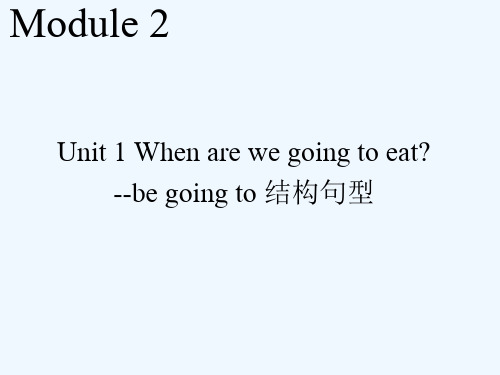
二、按要求改写下列各句
1.We are going to play ping-pong on Saturday.(改为一
般疑问句并作否定回答)
-_A__r_e_y_o__u_ going to play ping-pong on Saturday?
-___N_o_____,we __a_r_e_n_’__t_.
Are they going to have a party?
总结:变一般疑问句直接把be动词提前。
肯定句
否定句
一般疑问句
回答
I am going tgoing to to visit China. visit China?
Yes,I am. No,I'm not.
表示打算做某事或计划做某事
tomorrow , next week/month/year , this evening, in 2050…
主语 + be going to + 动词原形
be 动词随主语的变化
⑴I am going to play football.
而改变
He is going to go fishing.
You are going to You are not
Are you going
buy some clothes. going to the to the park
park tomorrow. tomorrow?
He/She is going He/She is not Is he/she going
Module 2
Unit 1 When are we going to eat? --be going to 结构句型
Module 2 Unit 1-When are we going to eat教学案

《Module 1 Unit 2-When are we going to eat?》教学案一、教学目标:1.学习目标语句:When are we going to eat?We’re going to eat at half past twelve.What are we going to do? We’r e going to walk around the lake.2. 学习并识别单词:duck ,noisy ,并能书写in the park 、have a picnic、under the tree.3. 能口头运用When are we going to eat ?这类词句询问计划的活动时间,并能口头运用At half past twelve .这类词句回答。
二、预习学案1. 用提问题法让学生课前搜集动词短语:What do you like doing in your spare time ?(课余时间) I like doing …(play football\ basketball \table tennis \listen to music \read books \play computer games …)2. 听音预习课文。
三、导学案1. Listen to the tape. (Listen and point 整体感知课文内容)2. Listen again and circle the new words and important sentences. ( duck \ noisy \ wet )When are we going to eat? At half past twelve.What are we going to do now? We are going to walk around the lake.3. Read them in small groups and then show them.4. Listen again and repeat it.5. Listen again then talk about the questions.A. What are they going to eat?B. What are they going to do now?C. Where are they?D. Are the ducks very noisy and hungry?6. Practice:先让学生把例句读一遍,然后小组内讨论完成其它三幅图,再小组展示。
M2U1 When are we going to eat(教案)-2022-2023学年六年级英语

Module 2Unit 1 When are we going to eat?一、教学目标1.语言知识目标(1)全体学生能听说读写: to go, duck, noisy,pond, clo ud, dry, l ike, look like, stay;(2)95%的学生能理解课文大意并能准确认读课文;(3)在复习巩固 be going to 句型的基础上掌握句型:When are we going to eat? We are going to eat athalf past twelve.2.思维能力目标(1)利用问题信息来理解单词或句子的意思,并能掌握重点单词和句型;(2)能用英语流利地复述这个故事;3.学习能力目标(1)能用be going to制定自己的周末计划,介绍自己的周末计划,提高综合运用语言能力。
4. 文化品格目标通过设计有趣的活动,来提高学生学习的兴趣;设计并介绍自己的周末计划,体会学以致用的快乐。
二、教学重点(1)掌握本单元重点单词和句子,能用英语流利地介绍这个故事;(2)制定自己的周末计划,能用be goi ng to介绍自己的周末计划。
三、教学难点1. 学生能理解并正确朗读对话。
2. be going to 句型中,be动词的相应变化。
四、教学准备PPT、单词卡片、教学助中的各种资源。
五、教学方法任务型教学法,讲解法,多媒体教学法六、教学过程Step 1:Warm-up1. Greeting.2. Let's say.用学过的动词或者动词短语描述图中的动作。
We are going to...(复习动词短语,引出本课主要句型。
)Step 2:Lead-in1.Watch and answer(播放活动一视频)Q:What time is it now?Q:What is Simon going to do?2.Read and choose.帮助学生理解一般将来时的用法。
Module2Unit(1)Whenarewegoingtoeat_(课件)(一起)英语六年级下册

Simon's mum didn't bring any drinks.
It't fun to drink this way!
Do they have a good picnic? What's wrong with(怎么了) their picnic?
What's wrong with(怎么了) their picnic?
问题解决 The Resolution
开篇
The Beginning (who/what/when/
where)
结局 The Ending
Look and say
The beginning of the story
(Who/ what/ where/ when )
Read part2 and answer
weather(天气)
how
Brain-storm
where who
what
1. Retell the text to your friend.
2. Make a picnic plan by the mind map.(根据思维导图指 定自己的野餐计划)
THANKS
There are some uncontrollable factors(不可控因素). If your travel is not perfect(不完美),
what can you do?
× complain(抱怨)
× blame(责怪)
anger
×
Stay active(积极的), Stay positive(乐观的)!
开篇 The Beginning
结局 The Ending
M2U1When-are-we-going-to-eat-

• Maybe they're eating _____.
Listen and repeat.
wb p6-1
e
d
a
c
Fill in the blanks .
It’s a beautiful day. Mum, Simon and Daming are going to _h_a_v_e_a__p_ic_n_ic__ in the park. They are going to _e_a_t__ at half past twelve.It's _o_n_ly__ half past eleven. One hour __to_g_o___. There are some _d_u_c_ks_ on the lake. There are some dark c_l_o_u_d_s in the sky.
Make a weekend plan in groups.
Liuhou Park
We’re going to go to____.
We’re going to go there at__ .
We’re going to get there by _.
We’re going to ______. __________________.
Today we’re going to_h_a_v_e_a__p_ic_n_i_c__.
Listen and find.
Simon’s questions: 1. When are we going to eat, Mum?
2. What time is it now?
Module2Unit1Whenarewegoingtoeat(教案)-六年级英语下学期(三起)
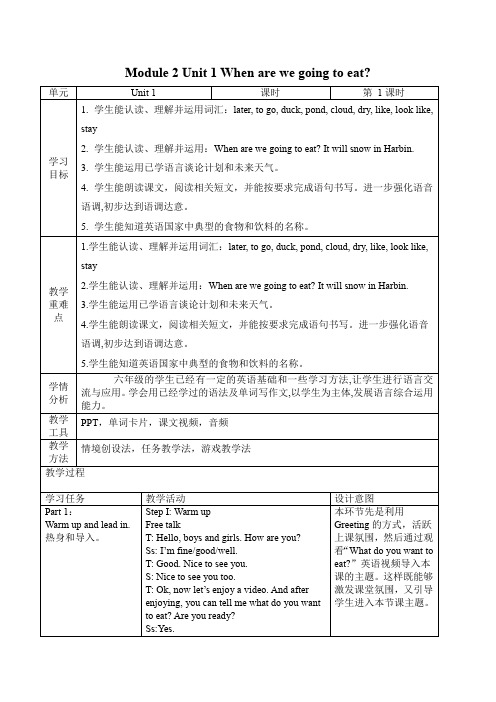
Module 2 Unit 1 When are we going to eat?some questions.1. What are they going to do?2. When are they going to eat?3. What time is it now?4. What are the ducks doing?T: Let’s have a try.S1:They are going to have a picnic.S2:At half past twelve.S3:It’s half past eleven.S4:They’re eating sandwiches.T: Good job!3)Read the story, then tell the story in class. Daming, Simon and Simon’s Mum are going to have a picnic in a park. What time is it? It’s___________.They are going to eatat_________. There is one hour to go.In the park, there are some __________. They are _________.And there are some dark ________.At half pat twelve, they are eating their_________.But now it’s_____. And the ducks are eating________.It looks like they are going to _____________.T:Look at the blank, and then write some words by yourselves.Ss:...T: Well done!4)Work in groupsWhat are you going to do?I’m going to...When are you going to go?I’m going to go at...T: Boys and girls, now I’ll divide you into four groups. You can role play the dialogue. T: Now, it’s show time. Who wants to play? Ss:...T: Congratulations!5)Listen the tape again. And then imitate the dialogue. Please pay attention to the pronounciation of these sentences.。
When-are-we-going-to-eat-导学案
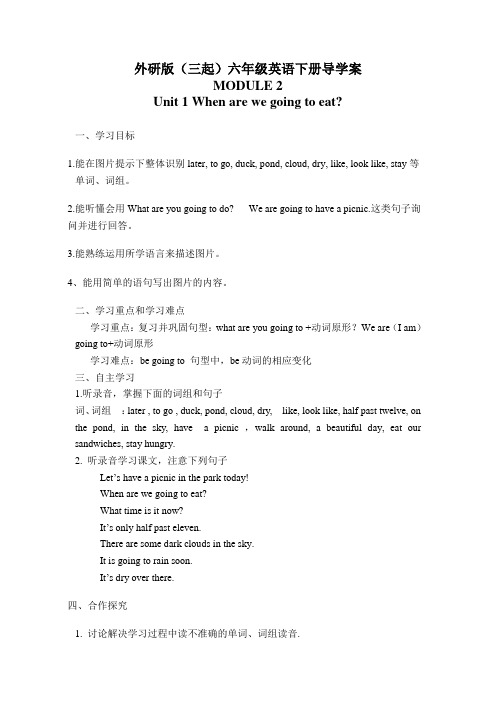
外研版(三起)六年级英语下册导学案MODULE 2Unit 1 When are we going to eat?一、学习目标1.能在图片提示下整体识别later, to go, duck, pond, cloud, dry, like, look like, stay等单词、词组。
2.能听懂会用What are you going to do? We are going to have a picnic.这类句子询问并进行回答。
3.能熟练运用所学语言来描述图片。
4、能用简单的语句写出图片的内容。
二、学习重点和学习难点学习重点:复习并巩固句型:what are you going to +动词原形?We are(I am)going to+动词原形学习难点:be going to 句型中,be动词的相应变化三、自主学习1.听录音,掌握下面的词组和句子词、词组:later , to go , duck, pond, cloud, dry, like, look like, half past twelve, on the pond, in the sky, have a picnic ,walk around, a beautiful day, eat our sandwiches, stay hungry.2. 听录音学习课文,注意下列句子Let’s have a picnic in the park today!When are we going to eat?What time is it now?It’s only half past eleven.There are some dark clouds in the sky.It is going to rain soon.It’s dry over there.四、合作探究1. 讨论解决学习过程中读不准确的单词、词组读音.2小组.检查单词、词组读音以及句子的学习。
外研版(三起)六下英语:M2U1 When are we going to eat?(2)

A:What are they going to do?
B:They are going to have a picnic
read books play basketball go shopping A: What are you going to do? B: I am going to…
I’m going to go swimming at five. I’m going to have a party at half past eight.
There are some ducks on the pond.
There are some dark clouds in the sky.
Do a survey: What are you going to do this weekend? I’m going to …
What
When
You can say like this: I’m going to read books in the afternoon. I’m going to play football at half past two. I’m going to ….at….
( B )1.When are they going to eat?
A. At twelve. B. At half past twelve. C. At half past eleven.
( A )2.What time is it?
A. It’s half past eleven. B. It’s ten . C. It’s eight.
3:30 .
half past five
六下M2U1 When are we going to eat
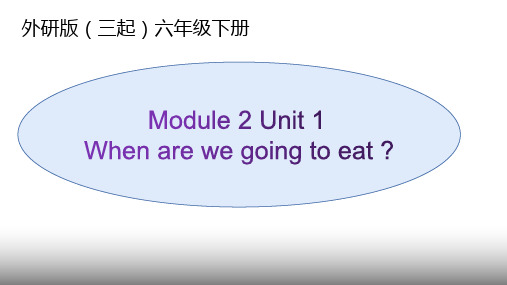
A: When are you _g_o_in_g__t_o_ __t_h_e __z_o_o__? B: At ten o'clock.
A: When are we going to watch the movie? B: _A__t__ _h_al_f_ _p_a_s_t __s_ix__.
Excises
Simon’s mum: I don’t think so. It’s a
beautiful day. Let’s go!
Simon’s mum: It’s half past twelve. Let’s have our picnic! Simon: Oh dear! It’s raining now!
Simon: I’m hungry. When are we going to eat, Mum? Simon’s mum: At half past twelve.
Simon: What time is it now? Simon’s mum: It’s only half past eleven. One
A. has
B. have
C. having
( C )2.My sister is going to______ in the 100 metres race (比赛).
A.running B. runs
C. run
( A )3.—_____ are we going to have breakfast?
Simon’s mum: It’s dry over there. Run, boys! Daming: Oh no, look at the ducks! They’re eating our
Module 2 Unit 1 When are we going to eat Period 1(
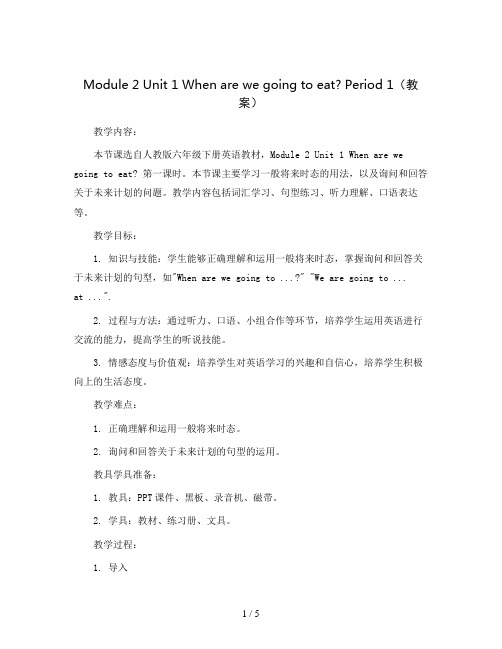
Module 2 Unit 1 When are we going to eat? Period 1(教案)教学内容:本节课选自人教版六年级下册英语教材,Module 2 Unit 1 When are we going to eat? 第一课时。
本节课主要学习一般将来时态的用法,以及询问和回答关于未来计划的问题。
教学内容包括词汇学习、句型练习、听力理解、口语表达等。
教学目标:1. 知识与技能:学生能够正确理解和运用一般将来时态,掌握询问和回答关于未来计划的句型,如"When are we going to ...?" "We are going to ...at ...".2. 过程与方法:通过听力、口语、小组合作等环节,培养学生运用英语进行交流的能力,提高学生的听说技能。
3. 情感态度与价值观:培养学生对英语学习的兴趣和自信心,培养学生积极向上的生活态度。
教学难点:1. 正确理解和运用一般将来时态。
2. 询问和回答关于未来计划的句型的运用。
教具学具准备:1. 教具:PPT课件、黑板、录音机、磁带。
2. 学具:教材、练习册、文具。
教学过程:1. 导入a. 跟唱歌曲"When are we going to ...?",激发学生学习兴趣。
b. 引导学生谈论自己的周末计划,复习一般将来时态的句型。
2. 新课展示a. 利用PPT展示本节课的主要教学内容,如词汇、句型等。
b. 通过听力练习,让学生理解和掌握新知识。
3. 小组合作a. 学生分组,每组选择一个场景,如公园、商场、餐厅等,讨论并编排一段对话。
b. 各小组展示对话,其他学生进行评价。
4. 巩固练习a. 完成练习册上的相关练习,巩固新知识。
b. 教师选取部分练习题,进行讲解和答疑。
5. 总结与布置作业a. 教师对本节课的内容进行总结,强调重点和难点。
b. 布置课后作业,要求学生完成练习册上的相关练习。
- 1、下载文档前请自行甄别文档内容的完整性,平台不提供额外的编辑、内容补充、找答案等附加服务。
- 2、"仅部分预览"的文档,不可在线预览部分如存在完整性等问题,可反馈申请退款(可完整预览的文档不适用该条件!)。
- 3、如文档侵犯您的权益,请联系客服反馈,我们会尽快为您处理(人工客服工作时间:9:00-18:30)。
When are we going to eat?
•
Magic eyes!
later look like drycloud podgo to duck
stay
Magic eyes!
later后来
to go剩余 duck鸭子 pond池塘
look like 看来像 dry干的
cloud云
2.Read the text. Try your best to memorize it.
wb p6-1
e
d
a
c
Fill in the blanks .
It’s a beautiful day. Mum, Simon and Daming are going to ____________ have a picnic in the eat at half past park. They are going to _____ twelve.It's _____ only half past eleven. One to go hour _______. ducks on the lake. There are some _____ There are some dark clouds _____ in the sky.
stay保持,维持
Sports meeting
do the long jump
do the high jump
run a race
skip
1)---What are you going to do? ---I am going to…… 2)---What is he∕she going to do?
Listen and answer.
1. When are they going to eat? At half past twelve.
2. What time is it now? It’s only half past eleven. 3. What are the ducks doing? They are eating their sandwiches.
eating their sandwiches. The ducks are ________ The ducks are very________. naughty stay hungry. Simon is going to ____
Homework:
1. Wtite a short passage about your weekened plan(What are you going to do at the weekend?)
---He/She is going to ……
Importance
be going to 用来表示按计划或将要发生的动 作,有“准备;打算”的意思。
基本结构:
人或物+ be going to +动词原形
be动词(am, is, are )要随着句中主语人称 和数的变化而变化。
A: What are you going to do? B: I am going to…
